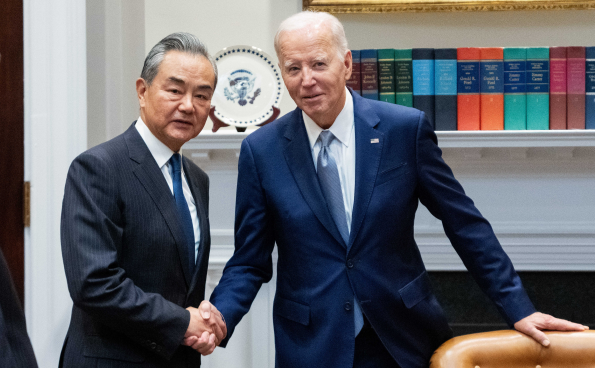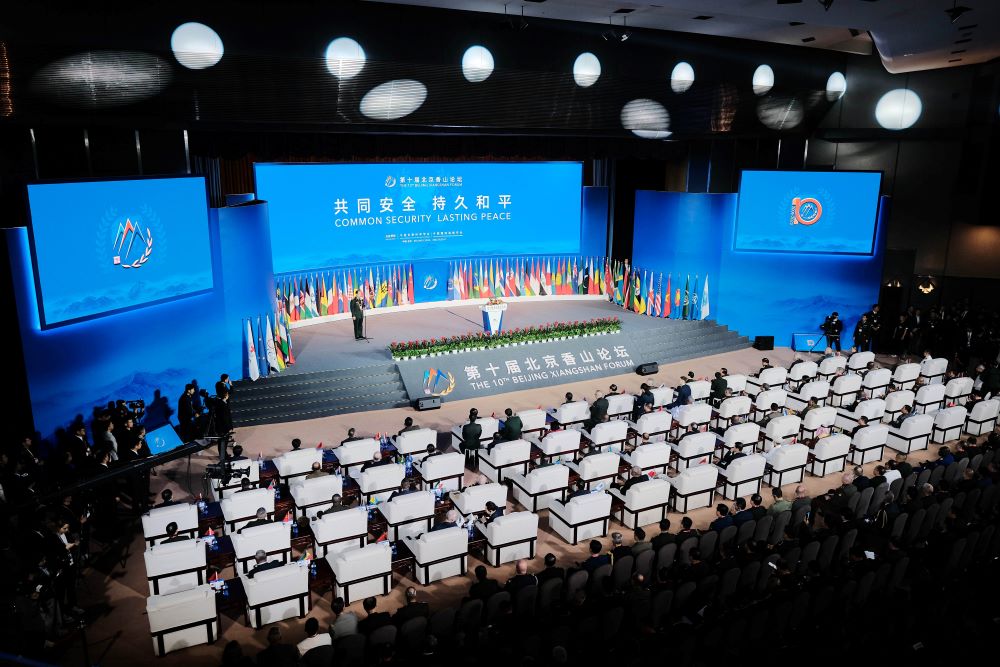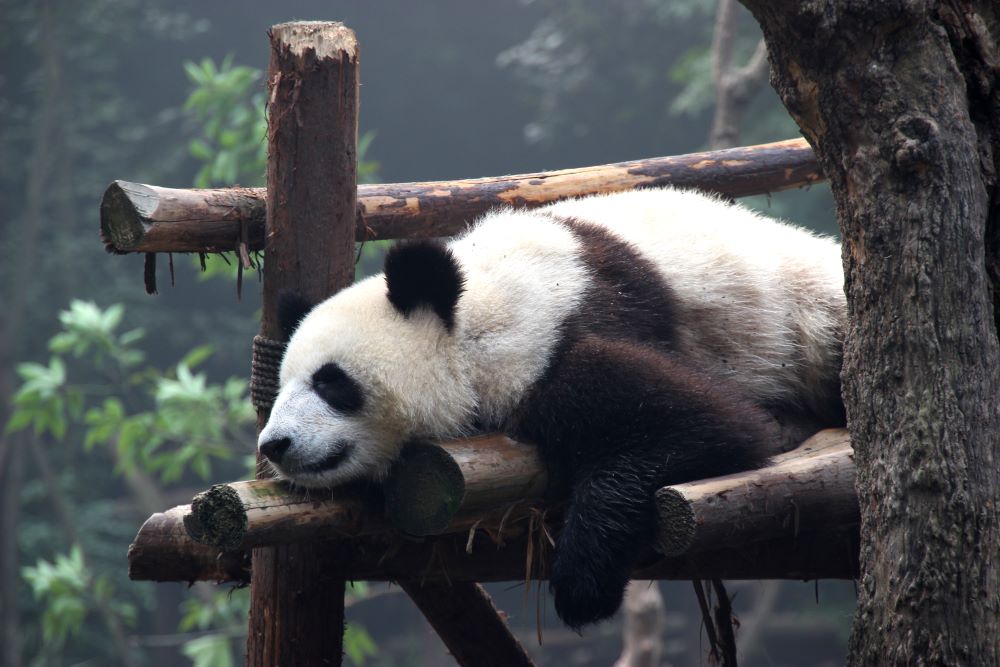
ICAS Bulletin (online ISSN 2836-3418, print ISSN 2836-340X) is published every other week throughout the year at 1919 M St NW, Suite 310, Washington, DC 20036.
The online version of ICAS Bulletin can be found at chinaus-icas.org/bulletins/.

– From October 26-28, Chinese Foreign Minister Wang Yi visited Washington D.C., meeting with various officials including U.S. President Biden, National Security Advisor Jake Sullivan and Secretary of State Anthony Blinken. A wide variety of topics were discussed, including the conflicts in Ukraine and Israel. While in Washington,
Wang said the “road to the San Francisco summit will not be a smooth one,” in reference to the expected meeting between Presidents Joe Biden and Xi Jinping.
– A Hong Kong forum on U.S.-China relations will be held from November 9-10 in preparation for the APEC summit to come. The organizers said their goal is to craft “an optimistic” tone before the summit.
– After Chinese Vice Premier He Lifeng was announced as head of the office of the Central Financial Commission (CFC) on November 6, U.S. Treasury Secretary Janet Yellen said she will meet with her new counterpart He in San Francisco ahead of the Biden-Xi summit.
– On November 2, Secretary Yellen assuaged Chinese concerns over the potential for an economic division, saying a full decoupling of the two economies was “simply not practical.”
– The United States will be sending a delegation to the China International Import Expo (CIIE), including Jason Hafemeister, acting deputy undersecretary for trade and foreign agricultural affairs at the USDA, to be held from November 5-10, marking the first time that such high-level U.S. officials have attended the event.
– Beijing said that Hong Kong’s financial secretary Paul Chan will attend an APEC meeting on November 15-17 in San Francisco. He will be standing in for Chief Executive John Lee, who is currently under U.S. sanctions.
– The last week of October, California Governor Gavin Newsom took a weeklong tour of China in order to promote climate cooperation between the U.S. and China, meeting with President Xi Jinping on October 25.
Associated News References:
“Hong Kong forum on US-China ties aims to create ‘optimistic’ tone ahead of Apec summit,” South China Morning Post, November 7 [Paywall]
“U.S. Treasury’s Yellen to meet Chinese vice premier ahead of APEC summit,” Reuters, November 6
“Yellen: Indo-Pacific allies should not have to choose between US, China,” Reuters, November 2
“CIIE 2023: US to send strongest-ever delegation to China International Import Expo amid improving ties,” South China Morning Post, October 31 [Paywall]
“Hong Kong finance chief to attend APEC meet, side-stepping dispute,” Reuters, October 31
“China’s foreign minister suggests road to Xi-Biden summit will not be smooth,” Reuters, October 28
“China’s top diplomat raises hopes for improving US ties as he starts three-day visit to Washington,” AP, October 26
“China says it wants to bolster climate cooperation with US as California Gov. Newsom visits Beijing,” AP, October 26

– The Chinese Ministry of Commerce announced that exporters of rare earth minerals will have to report details of these shipments to the Ministry, to “stabilize the country’s foreign trade.”
– U.S. company Energy Vault Holdings Inc., which creates renewable energy through lifting heavy objects, has made agreements with local Chinese governments to create around 1,000 megawatt-hours worth of storage.
– According to an analysis of Chinese data, foreign firms have pulled more than $160 billion in total earnings out of China within the last six quarters, with one specific reason for the move being the greater difference between Chinese and Western interest rates.
– Apple’s situation in China continues to worsen, as its holiday-quarter outlook reflects disappointment and concern. The company has reported its lowest revenue in the region since 2022.
– On November 2, President Biden met with heads of the Dominican Republic and Chile in a bid to increase trade ties with Latin America to disrupt China’s influence.
– A delegation of dozens of U.S. agriculture leaders visited China to bolster farm trade between the two countries. In the previous week, Chinese importers made agreements with the U.S. to buy billions of dollars worth of produce.
– On November 1, top members of a U.S. House committee on China introduced the “America Security Drone Act” to ban the U.S. government from buying Chinese drones.
– U.S. lawmakers have questioned Costco Wholesale over its products which may have links to alleged forced labor in China. Some of these products include seafood and security cameras.
Associated News References:
“China to Scrutinise Rare Earth Outflows as Exports Rise,” Asia Financial, November 7
“China Energy Storage Push Gets Boost From New Gravity Projects,” Bloomberg, November 6 [Paywall]
“Foreign Firms Pull Billions in Earnings Out of China,” The Wall Street Journal, November 6 [Paywall]
“Apple’s Disappointing Outlook Spotlights Growing China Woes,” Bloomberg, November 2 [Paywall]
“The Biden administration pushes for more US-Latin America trade, seeking to lessen Chinese influence,” AP, November 2
“U.S. farm leaders, visiting China, talk up agriculture trade,” Reuters, November 2
“US House panel seeks ban on federal purchases of China drones,” Reuters, November 1
“Lawmakers Press Costco on China Forced Labor,” The Wall Street Journal, November 1 [Paywall]

– On November 3, China’s Director-General for Boundary and Ocean Affairs Hong Liang met with the U.S. State Department’s China Coordinator Mark Lambert in Beijing for maritime talks. The State Department says the talks were “substantive, constructive, and candid.”
– China hosted their annual Xiangshan Forum, a military diplomatic event, from October 29-31 in Beijing. The U.S. Defense Department sent a principal director, hoping to restart talks after China froze military exchanges due to Nancy Pelosi’s visit to Taiwan last August.
– At the Xiangshan Forum, speeches by Chinese officials were depicted as cautioning the U.S. against involvement in foreign affairs. “Certain countries want to see chaos in the world,” People’s Liberation Army vice chairman Gen. Zhang Youxia said in regards to the U.S.
– Beijing welcomed former members of the U.S. “Flying Tigers” Air Force, which helped to defend China against Japan during WWII. “China and the U.S. stood together in the fight against Japanese fascism…and forged a profound friendship,” President Xi said in the letter written to the veterans in September.
Associated News References:
“US airs concerns to China about ‘dangerous and unlawful’ South China Sea actions,” Reuters, November 3
“As Biden and China’s Xi Prepare to Meet, Their Militaries Are Butting Heads,” The Wall Street Journal, October 31 [Paywall]
“China and Russia take aim at US at Chinese military forum,” Reuters, October 30
“China salutes US ‘Flying Tiger’ veterans and relatives on friendship mission,” South China Morning Post, October 30 [Paywall]
“China and the US appear to restart military talks despite disputes over Taiwan and South China Sea,” AP, October 26

– Chinese Commerce Minister Wang Wentao told Sanjay Mehrotra, CEO of U.S.-based Micron Technology, that Beijing is welcoming U.S. semiconductor companies to ingratiate themselves within the Chinese market.
– On November 1, the UK held their AI Safety Summit during which the U.S., China and several other nations agreed to cooperate in the face of potential AI “catastrophic harm.” Nations “have stated a shared responsibility to address AI risks,” summarized British Prime Minister Rishi Sunak.
– The White House’s top science adviser, Arati Prabhakar, openly expressed support for the UK’s decision to invite China to the summit, despite other cases of dissent.
– Chinese laser sensor maker Hesai has been a target for geopolitical tensions between the U.S. and China, marked by its stock dropping more than 50% since it first launched this February on Nasdaq.
– Burn Lin, a former executive at TSMC, said in an interview at a Taiwanese university that the U.S. will not be able to curtail Chinese companies from advancing in semiconductors.
– On October 25, the U.S. government ordered chipmaker Nvidia to halt exports of AI chips to China effective immediately despite previous plans to enact restrictions starting in mid-November.
Associated News References:
“China warms to U.S. chipmaker Micron, as tensions with Washington ease,” Reuters, November 3
“US and China join global leaders to lay out need for AI rulemaking,” Politico, November 1
“Chinese Laser Sensor Maker Targeted as Tech Trade War Spreads,” The Wall Street Journal, October 31 [Paywall]
“US Can’t Halt SMIC, Huawei’s Tech Advances, Chip Guru Says,” Bloomberg, October 26 [Paywall]
“White House backs up U.K. decision to invite China to AI summit,” The Washington Post, October 26 [Paywall]
“US orders immediate halt to some AI chip exports to China, Nvidia says,” BBC News, October 25

– On November 2, a group of Republican senators introduced a bill to impose tariffs on products imported from countries with loose environmental regulations, including China.
– The U.S. military is supplying its troops stationed in Japan with bulk-bought Japanese seafood in response to China’s ban on these products following the release of treated nuclear wastewater from Fukushima.
– In recent weeks, the U.S. and China have released video clips in a parallel fashion, accusing one another of provocative military craft actions in the South China Sea. According to Beijing, their newest clip shows the USS Ralph Johnson harassing a Chinese navy task group. The U.S. then released a video of a US Air Force bomber and a Chinese fighter jet nearly colliding during a nighttime maneuver.
– China vetoed a proposal by the United Nations Security Council to call for a humanitarian pause backed by the U.S. Beijing has called it “evasive” and “seriously out of balance.”
Associated News References:
“Senate Republicans introduce a climate bill — aimed at China,” Politico, November 2
“Exclusive: US military bulk buys Japanese seafood to counter China ban,” Reuters, October 30
“US military says Chinese fighter jet came within 10 feet of B-52 bomber over South China Sea,” AP, October 27
“China, US Release Dueling Videos With Accusations of Provocation,” Bloomberg, October 26 [Paywall]
“China vetoes ‘evasive’ US proposal as UN Security Council remains deadlocked on Israel-Gaza war,” South China Morning Post, October 26 [Paywall]

“‘The China Project’ media shuts, blaming ‘politically-motivated attacks’,” Al Jazeera, November 7
“US viewed more positively as China sinks in approval, poll shows,” Al Jazeera, November 7
“Philadelphia Orchestra returns to China 50 years after historic visit,” NBC News, November 7
“Pacific Islands Forum: four leaders fail to attend as China-US rivalry takes centre stage,” The Guardian, November 6
“WeWork China will not participate in WeWork’s strategic reorganisation,” Reuters, November 6
“Biden picks Asia hand Kurt Campbell as deputy secretary of state,” Reuters, November 1
“China’s Confucius Institutes Are Disappearing From US Campuses,” Bloomberg, November 1 [Paywall]
“Hong Kong Drops Gun-Possession Charge Against US Lawmaker,” Bloomberg, October 30 [Paywall]
“As economy falters, more Chinese migrants take a perilous journey to the US border to seek asylum,” AP, October 30
“US vows to support ‘free media’ in Pacific as concern over China influence grows,” Guardian, October 29
“Terry Gou Says Apple, Tesla Links Mean China Can’t Pressure His Business,” Bloomberg, October 28 [Paywall]
“DeSantis Says He Will ‘Reorient’ U.S. Foreign Policy to Counter China,” The New York Times, October 27 [Paywall]
“DC pandas will be returning to China in mid-November, weeks earlier than expected,” AP, October 26 [Paywall]
“US ally Colombia swings towards China,” Financial Times, October 25 [Paywall]
On October 17, the Institute for China-America Studies (ICAS) organized its 2023 Annual Conference. With COVID-19 thankfully more or less in the rear-view mirror, the conference was held in full, in-person format for the first time in more than four years. Dr. Hong Nong, Executive Director of ICAS, opened the conference and Dr. Wu Shicun, Chairman of ICAS’ Advisory Board, delivered the introductory remarks. In his heartfelt message, Dr. Wu spoke of the pressing need for both sides to present a forward-looking vision of ties so as to remove risks to the bilateral relationship and stabilize its long-term development. China and the United States are not fated to fall into a ‘Thucydides Trap’, and decision-makers on both sides must ensure that such a circumstance does not come to pass. Casting his own family’s experience as a typical example, Dr. Wu referred to the innumerable people-to-people ties that many Chinese share with the United States and the American people at large. Such relationships must never be decoupled, he noted, and future generations of Chinese and Americans must not pay the price of bad decisions that are taken today. Concluding, he hoped that the annual conference would throw up vibrant ideas and solutions to the many challenges being faced and articulate a new paradigm of ties that could rehabilitate and relaunch China-U.S. relations on a stable track for the next quarter century.

by Wu Shicun
October 25, 2023
I believe that history has come to a moment to test the wisdom of the Chinese and American governments and even the whole of humanity. I am confident that we can make history and create a new world of peaceful coexistence among great powers.
First, the Thucydides Trap only represents the past, not the future. Rather than simply repeating itself, history keeps opening up new paths and seeking ways of coexistence. History will never allow China and the United States to repeat the Thucydides Trap because it could mean the destruction of civilization and even the destruction of the Earth…
November 8-9, 2023 [GMT +8]
From Wednesday, November 8 to Thursday, November 9, ICAS Executive Director and Senior Fellow Dr. Nong Hong and Research Associate and Administrative Officer Yilun Zhang will attend the “2023 Symposium on Global Maritime Cooperation and Ocean Governance” at the Grand Hyatt Sanya in Haitang Bay, Sanya, China.
Dr. Nong will be participating in Session 7 discussing “Global Climate Change and Polar Research” while Mr. Zhang will be participating in Session 2 discussing “Mutual Confidence Building in the South China Sea from the Perspective of Global Security Initiative”
On Friday, October 27, 2023, Senior Fellow Sourabh Gupta discussed US-China relations and Foreign Minister Wang Yi’s visit to Washington on CGTN America’s The Heat.
On Thursday, October 26, 2023, Senior Fellow Sourabh Gupta discussed Foreign Minister Wang Yi’s visit to the US on CGTN’s World Insight.
On Thursday, October 26, 2023, Senior Fellow Sourabh Gupta was quoted in South China Morning Post on Foreign Minister Wang Yi’s visit to the United States.

The Institute for China-America Studies is an independent nonprofit, nonpartisan research organization dedicated to strengthening the understanding of U.S.-China relations through expert analysis and practical policy solutions.
1919 M St. NW Suite 310,
Washington, DC 20036
icas@chinaus-icas.org
(202) 968-0595
© 2025 INSTITUTE FOR CHINA-AMERICA STUDIES. ALL RIGHTS RESERVED.